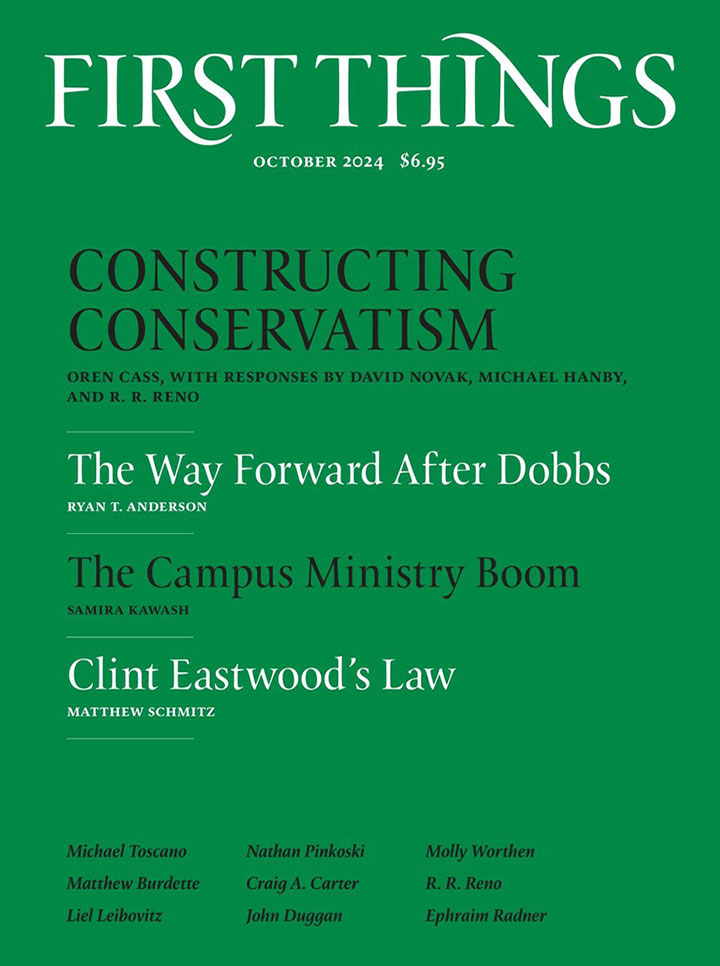
Leftist attacks on Zionism, which in many quarters have devolved into overt anti-Semitism, seem strange alongside the left’s cultural agenda of diversity and inclusion. But perhaps the contradiction is only apparent.
Today’s constant celebrations of diversity are meant to obscure a drive for total ideological homogeneity. The new guardians of our culture hide their agenda, even from themselves, because they cannot admit that they are exercising power—for in the moral rules they’ve laid down, exercising power is synonymous with oppression. Their status therefore requires them to conceal their power, and their talk of diversity works as camouflage. The ideologically defeated have a place in the new order in principle (“all are welcome here”), but not in fact. And when they express frustration about this fact, the powerful accuse them of refusing to cede power, thus ensuring that those who have driven them out appear to have clean hands. By pretending that the old regime still holds power, and creating an environment of permanent protest against it, those in power make it impossible to acknowledge openly that there has been a regime change.
But the metaphor of regime change goes only so far in making sense of today’s dominant culture and, by extension, its religion. In its place, I suggest the theological concept of supersessionism.
In biblical religion, one of the animating paradoxes is the belief that YHWH, the God of Israel, is also the God of all creation and therefore the God of all people. The Lord’s election of Israel and identification of himself as the God of Israel is the way he exercises his rule over all nations. The history of God’s dealings with Israel does not render obsolete or meaningless the histories of other nations; rather, the history of God’s relationship with Israel is somehow mysteriously also the history of God’s dealings with the other nations. Israel is God’s chosen nation, and yet every other nation is, in Saint Paul’s words, “without excuse.”
People of faith have often experienced this paradox as an intolerable contradiction. The Bible recounts, for example, ancient Israel’s temptation to reduce YHWH to a tribal deity. For Christians, the temptation has been to treat God’s election of Israel and God’s reign over all nations as sequentially rather than paradoxically related: that God rules over Israel until he rules over all nations in and through the mission of the Church, which replaces Israel, and the Lord leaves Israel behind. In this view, the Church of the nations supersedes Israel, and there is no longer a place for Israel as God’s elect.
Ironically, the attempt to smooth out the biblical paradox just creates another intolerable contradiction. For by rejecting Israel, the supersessionist denies that God is the God of all people. God is permitted to be the God of all people, just as long as he is not the God of those people. In order to avoid facing this contradiction, the supersessionist blames Israel: They cling to their special status, refusing to be one of us. Of course they have a place here, were they only willing to let go of their claim to be God’s covenant people.
This supersessionism finds expression today in at least two places. First, it appears in Islam, which accepts the Bible’s radical monotheism and the universality of the one God’s rule, but leaves behind Israel’s election, so that God is understood to be the God of all by being the God of all but the Jews.
Second, supersessionism appears in progressivism. Many people have commented on the anti-Semitism of the political left, but few have clarified its theological roots. Liberal progressivism is the product of a supersessionist interpretation of Christianity: It is an embrace of universalism and a rejection of particularity. It can tolerate difference only as long as none of the differences matter.
The moralism of liberal Protestantism has always been shaped by a rejection of Israel’s election. That God identifies himself as the God of Israel strikes these Christians as an intellectual embarrassment. It is untenable to imagine that the God of all creation should be radically identified with the concrete realities of human history. Today this attitude is still visible in liberal Christian institutions, which are in the midst of yet another supersessionist upheaval, only this time, instead of rejecting just the Jews, God is said to reject the theological traditionalists whom he once appointed as stewards of the faith. Across liberal Christian denominations, the Christianity of just a few years ago has been functionally anathematized. The rainbow flags have been raised, and though the traditionalists haven’t been told plainly to leave, it’s clear that they are no longer welcome in their own churches. God is the God of all—just not of those people.
Liberal Christianity lost its privileged place in society generations ago, but the decline of liberal Protestant institutions does not mean the failure of liberal Christianity. This form of Christianity gave birth to our progressive culture, and though it is dying it remains in the house, like an aged matriarch whose influence is still felt.
Liberal Christian institutions are a microcosm of Western culture. And what we see in them today is the same old supersessionism—a hatred of the past, a hatred of the particular, a hatred of the idea that the God of all exercises his universal reign by being the God of Israel and the Father of the Israelite Jesus. This attitude is felt throughout the culture: a hatred of Jews, a rejection of history, a proclamation of universal human “siblinghood” that makes no room for certain kinds of people. No one should be surprised at its various forms: celebrations of diversity, injunctions to love and kindness and inclusion (though not of one’s ideological opponents), and a culture of permanent protest against already vanquished enemies. These and other progressive shibboleths represent consolidation of power masquerading as concern for the weak and the vulnerable.

